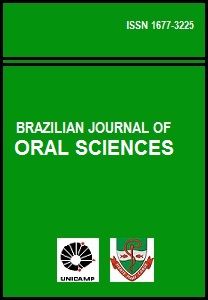Abstract
The aim of this study was to determine whether there are differences in the attitudes of Dentistry School Professors from two universities, one private and one public, concerning HIV-positive patients or HIVpositive health care professionals. A questionnaire was handled to all professors at the Araçatuba Dental School of São Paulo State University - FOA-UNESP (public) and Lins Dental School of the Piracicaba Methodist University - FOL-UNIMEP (private). When asked if they would be willing to be treated by an HIV-infected health care professional, 38.9% of the 77 professors at FOA-UNESP replied that they would accept only non-invasive treatments and 13% would not accept any kind of treatment; the same applied to 42.4% and 15.2% of the 33 FOL-UNIMEP professors. Among the 54 professors at FOA-UNESP and 27 at FOL-UNIMEP providing clinical service, only 31.5% and 18.5% stated that they treat HIV-infected persons like any other patient. The results were very similar in both schools. Although they reported that they taught their students not to act in a discriminatory manner towards HIV-positive patients, the professors themselves showed prejudice towards infected patients and professionals. Consequently, this topic must be further debated in the academic milieu.References
Araujo MWB, Andreana S. Risk and prevention of transmission of infectious diseases in dentistry. Quintessence Int. 2002; 33: 376-82.
Chikte UME, Naidoo S. Ethical and legal issues around HIV/AIDS in dentistry in South Africa. S Afr Dent J. 2000; 55: 701-5.
Disccacciati JAC, Pordeus IA. Você está disposto a tratar pacientes com AIDS? Rev Cons Reg Odontol Minas Gerais. 1997; 3: 31-6.
Kermode M, Jolley D, Langkham B, Thomas MS, Crofts N.
Occupational exposure to blood and risk of bloodborne virus infection among health care workers in rural north Indian health care settings. Am J Infect Control. 2005; 33: 34-41.
CDC – Centers for Disease Control and Prevention. Updated USPHS guidelines for managing occupational exposure to HBV, HCV and HIV and considerations for Dentistry. J Am Dent Assoc. 2002; 133: 1627-9.
Disccacciati JAC, Villaça EL. Atendimento odontológico ao portador do HIV: medo, preconceito e ética profissional. Rev. Panam Salud Publica. 2001; 9: 234-9.
Gerbert B, Maguire B, Badner V, Greenspan D, Greenspan J, Barnes D, et al. Changing dentists’ knowledge, attitudes, and behaviors relating to AIDS: a controlled educational intervention. J Am Dent Assoc. 1988; 116: 851-4.
Gerbert B, Sumser J, Chamaberlin K, Maguire BT, Greenblatt RM, Macmaster JR. Dental care experience of HIV-positive patients. J Am Dent Assoc. 1989; 119: 601.
Gerbert B. AIDS and infection control in dental practice: dentists’ attitudes, knowledge and behavior. J Am Dent Assoc. 1987; 114: 311-4.
Lopes VS, Pordeus IA, Paixão HH, Discaciatti JAC. Indivíduos HIV positivos: revelação de soropositividade e negação de atendimento odontológico. Pesq Odontol Bras. 1988; 15: 182.
Ramos DLP, Maruyana NT. A discriminação no atendimento odontológico a pacientes HIV+. O mundo da Saúde. 1996; 2: 20.
Rezende LR, Ramos DLP. Cirurgião-dentista, sorologia positiva para HIV: as opiniões de um segmento da categoria odontologia sobre a questão. In: Anais do XVI Congresso Brasileiro de Medicina Legal, V Congresso Brasileiro de Odontologia Legal. 2000; Recife (PE). Recife: Instituto Brasileiro de Ensino e Pesquisa em Medicina e Odontologia Legal; 2000.
Lewis BE, Vernaglia LW. The application of disabilities law to HIV-positive professonals in the dental practice setting. J Mass Dent Soc. 2002; 51: 8-11.
Sposto MR, Santos SG, Domaneschi C, Navarro CM, Onofre MA. Avaliação do conhecimento sobre a infecção HIV de estudantes de odontologia antes e após palestra informativa. J Appl Oral Sci. 2003; 11: 125-32.
Sfikas PM. HIV and discrimination: a review of the Waddel case and its implications for health care professinals. J Am Dent Assoc. 2002; 133: 372-4.
Brasil. Ministério da Saúde. Secretaria de Políticas de Saúde. Coordenação Nacional de DST/AIDS. Área Técnica de Saúde Bucal. Controle de Infecções e a prática odontológica em tempos de AIDS. Brasília: MS; 2000.
Conselho Federal de Odontologia. Código de Ética Odontológico. Rio de Janeiro: CFO; 2002.
Rissi MRR, Machado AA, Figueiredo MAC. Health care workers and AIDS: a differential study of beliefs and affects associated with accidental exposure to blood. Cad Saude Publica. 2005; 21: 283-91.
King WD, Wong, MD, Shapiro, MF, Landon BE, Cunningham WE. Does racial concordance between HIV-positive patients and their physicians affect the time to receipt of protease inhibitors? J Gen Intern Med. 2004; 19: 1146-53.
Daniel NPF, Machado PF, Sala MA, Komesu MC. Attitudes of dental students and dental professionals caring for HIV-positive patients in São Paulo, Brazil. AIDS Patient Care STDS. 2004; 18: 63-5.
Garbin CAS, Garbin AJI, Barbosa ALP, Mariano RQ. HIV: você aceitaria ser tratado por um profissional de saúde portador deste vírus? Odontol Soc. 2001; 3: 60-4.
Oliveira ER, Narendran S, Falcão A. Brazilian dental students’ knowledge and attitudes towards HIV infection. AIDS Care. 2002; 14: 569-76.
Smith, CJ. HIV Infection and AIDS: educational and ethical aspects in relation to dentistry. Br Dent J. 1993; 175: 75-7.
The Brazilian Journal of Oral Sciences uses the Creative Commons license (CC), thus preserving the integrity of the articles in an open access environment.


